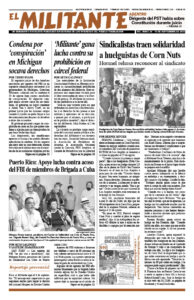For over six months, the Ukrainian people have mobilized and fought to prevent Moscow’s forces from conquering their country and crushing its independence. Repulsing attacks on Kyiv, the capital, and elsewhere in the northeast, they have sapped the morale of Moscow’s much bigger military forces. In the south, Kyiv’s army has launched a counteroffensive backed by partisans behind the lines, seeking to retake the Kherson region.
Russian President Vladimir Putin’s forces are weakened and have failed to make new gains for many weeks in their efforts to seize all of eastern Ukraine.
At the beginning of the invasion, Russian troops poured north from occupied Crimea to seize Kherson and the Zaporizhzhia nuclear power plant, in southeast Ukraine. They have occupied the plant — the largest in Europe — filling its grounds with artillery and tanks. Shelling there severed a power transmission line Sept. 5, disconnecting the plant from the Ukrainian electrical grid for now.
Natalia Kirtenko, a 64-year-old retiree living in Mykolaiv near Kherson, told the Wall Street Journal that the step up in shelling in the area has given people hope. “At least we know this means our guys are moving forward,” she said. “So our mood has improved.”
Counteroffensive in Kherson
Ukrainian forces launched a slow and deliberate counteroffensive to retake Kherson at the end of August. They have targeted supply routes and depots behind the battle lines to try to cut off and weaken Moscow’s forces. Ukrainian advances have retaken some villages. A picture of a Ukrainian soldier raising the country’s flag over Vysokopillya went viral.
Many of Kherson’s 280,000 residents rose up to protest when Russian forces rolled into the city. A savage crackdown by Putin’s troops drove protesters off the street, but didn’t crush most residents’ resolve to free the city of the invaders. While thousands of people fled, most of those remaining are determined to throw off the Russian yoke.
The Kremlin tries to depict the Ukrainian counteroffensive as a costly failure. However, the Russian-appointed administration in Kherson said Sept. 5 that its planned referendum at gunpoint aimed at its forced incorporation into Russia has had to be put on hold.
Kirill Stremousov, deputy head of the occupation authority, acknowledged Moscow’s invaders still had to make the population believe that “we are the ones liberating them.” The true character of Moscow’s “liberation” of Kherson was demonstrated when on Sept. 5 its authorities threatened to shoot anyone trying to cross the Dnipro River to escape.
The Ukrainian southern command reports that deteriorating conditions around Kherson have led the 127th Regiment of Russia’s 1st Army Corps to refuse to fight. Russian “personnel in advanced positions were left even without water.”
Pavel Filatyev, a Russian paratrooper from the elite 56th Regiment, released an Aug. 1 video calling on fellow soldiers to quit the war. Half the troops in his regiment have resigned their commissions, he said. Filatyev says that the Russian people will become as ashamed of the war in Ukraine as they are today of Moscow’s earlier brutal wars in Afghanistan and Chechnya.
In an online account he also describes how Russian troops in the Kherson region came apart amid resistance by the local population and the inability of Moscow to get them needed food and supplies.
Facing persecution and up to 15 years in prison for voicing opposition to the war, he decided to flee. He is seeking asylum in France.
While avoiding imposing a draft, the Kremlin has ordered Russian state companies to designate “volunteers” for the military from employee lists. State-managed railways are instructed to nominate 10,000 workers who will be forced to sign short-term military contracts and be press-ganged to the front lines.
Moscow cuts natural gas supply
The largest ground conflict in Europe since the second imperialist world war has accelerated the deepening economic crisis hitting working people across Europe. Natural gas prices have surged tenfold compared to a year ago. After Moscow’s Sept. 5 announcement that it was shutting down the Nord Stream 1 pipeline supplying gas to several European countries, stock prices fell and the euro plunged to a 20-year low against the dollar.
It’s working people across Europe who bear the brunt of skyrocketing electricity prices. Likewise, it’s working people in Russia who are hardest hit by sanctions imposed by Washington and other imperialist powers.
The sanctions are a barrier to deepening fraternization between Ukrainian and Russian working people.
Putin’s invasion has also prompted capitalist rulers worldwide to launch rearmament programs as each prepares to defend their own predatory interests against their rivals.

